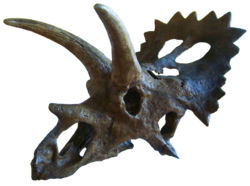Anchiceratops
|
Anchiceratops Temporal range: Late Cretaceous, 72–71 Ma |
|
|---|---|
 |
|
| Skull cast of TMP 1983.001.0001, Geological Museum (Copenhagen) | |
| Scientific classification | |
| Kingdom: | Animalia |
| Phylum: | Chordata |
| Class: | Reptilia |
| Clade: | Dinosauria |
| Order: | †Ornithischia |
| Family: | †Ceratopsidae |
| Subfamily: | †Chasmosaurinae |
| Genus: |
†Anchiceratops Brown, 1914 |
| Type species | |
|
†Anchiceratops ornatus Brown, 1914 |
|
| Synonyms | |
|
Anchiceratops longirostris |
|
Anchiceratops longirostris
Sternberg, 1926
Anchiceratops (/ˌæŋkiˈsɛrətɒps/ ANG-key-SERR-ə-tops) is an extinct genus of chasmosaurine ceratopsid dinosaur that lived approximately 72 to 71 million years ago during the latter part of the Cretaceous Period in what is now Alberta, Canada. Anchiceratops was a medium-sized, heavily built, ground-dwelling, quadrupedal herbivore that could grow up to an estimated 5 m (16.4 ft) long. Its skull featured two long brow horns and a short horn on the nose. The skull frill was elongated and rectangular, its edges adorned by coarse triangular projections. About a dozen skulls of the genus have been found.
Like other ceratopsids, A. ornatus was a quadrupedal herbivore with three horns on its face, a parrot-like beak, and a long frill extending from the back of its head. The two horns above the eyes were longer than the single horn on its snout, as in other chasmosaurines.
...
Wikipedia
